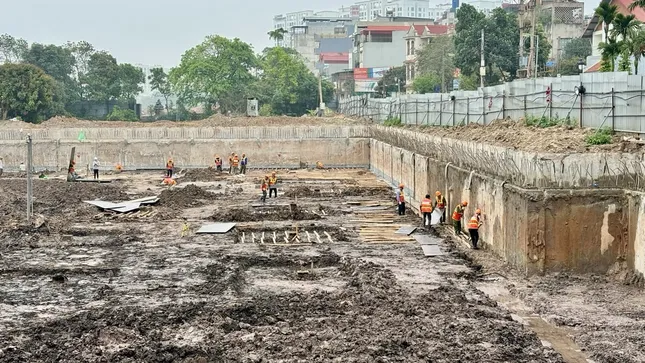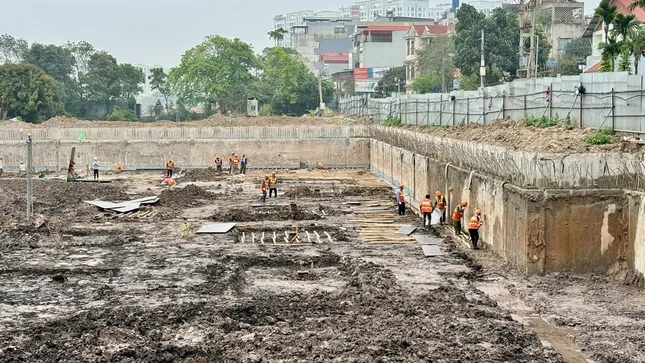Soaring Prices of Social Housing in Vietnam
The developer of the Upper Thanh social housing project (Rice City Long Chau) in Long Bien district, Hanoi, has announced an average selling price of approximately VND 26-27 million/m2. With this price, the project becomes the most expensive social housing project in Hanoi to date.
This means that a 70m2 apartment in this social housing complex would cost nearly VND 1.9 billion.

Rice City Long Chau social housing project in Long Bien, Hanoi, is the most expensive to date.
Previously, the highest tentative price for social housing was VND 25 million/m2 for the N01 Ha Dinh project in Thanh Tri district, followed by NHS Trung Van, which was launched at VND 19.5 million/m2.
In contrast, social housing projects from 5 to 10 years ago had price ceilings of under VND 15 million/m2.
Mr. Chu Van Hai, Head of the Housing Development and Management Department of the Social Housing and Real Estate Market Management Bureau under the Ministry of Construction, stated that the prices of social housing projects vary depending on the design requirements set by the investors and the scale of the project. Social housing in Hanoi used to be priced below VND 20 million/m2, but that is no longer the case due to increased labor and construction material costs.
Mr. Hai further explained that social housing is a segment supported by government policies to reduce costs. However, this type of housing must still adhere to the same quality and standards as commercial apartments. The differences between the two segments lie in factors such as area and design.
Housing Prices Surpass the Affordability of Target Buyers
Nguyen Quang Hung, who has been working in Hanoi for almost eight years and has saved over VND 600 million, believes that the price range of nearly VND 1.5 billion to nearly VND 1.9 billion for a social housing apartment is still very high for those with a monthly income of less than VND 20 million.
“With a price of nearly VND 1.9 billion, if I want to buy an apartment, I will have to borrow VND 1.3 billion. Putting aside the borrowing process, at the current interest rate, I will have to pay more than VND 200 million per year (principal and interest). With the difficult economy and rising expenses, this is indeed a challenging equation,” shared Hung.
In an interview with Tien Phong Newspaper, Mr. Nguyen Anh Que, a member of the Executive Committee of the Vietnam Real Estate Association, pointed out two main reasons for the high prices of social housing. Firstly, construction costs, including building materials and labor, have increased significantly in recent years. Secondly, there have been changes in the calculation of profit for social housing and land tax for the 20% commercial area within social housing projects, as stipulated in Decree 100/2024 compared to Decree 100/2015.
To illustrate the impact of these changes, Mr. Que provided the following example: “The NHS Trung Van social housing project, with an approved price of VND 19.5 million/m2 under Decree 100/2015, would have a price of around VND 27 million/m2 if Decree 100/2024 were applied.”
“For developers building social housing for workers or in districts and provinces where the selling price of social housing is below VND 15 million/m2 and the selling price of commercial apartments is below VND 20 million, their profits are not significant. However, in large cities like Hanoi, Ho Chi Minh City, Hai Phong, and Da Nang, the approved price for social housing can reach up to VND 27 million/m2, and the 20% commercial land within the project can be sold at nearly VND 100 million/m2…” Mr. Que explained.
Therefore, Mr. Que proposed combining the profits from the social housing portion and the profits from the 20% commercial land within the project, as was done previously. He also suggested increasing the profit margin for social housing developers to 13% and considering waiving the 5% value-added tax for social housing.
“I believe that if these proposals are accepted and implemented, the social housing project at 214 Nguyen Xien will have a price below VND 20 million/m2, and the Rice City Long Chau project will have a price below VND 21 million/m2…” Mr. Que added.
Mr. Que also mentioned that Decree 100/2024 stipulates the income conditions for individuals to be eligible to purchase social housing: the household income must be below VND 30 million/month, and for single individuals, the income must be below VND 15 million/month. These criteria are suitable for cities of grades 1 to 4 but not for centrally-run cities, especially Hanoi and Ho Chi Minh City, as the living costs in these cities, especially rental expenses, are much higher.
Consequently, Mr. Que recommended that the income criteria for centrally-run cities should be adjusted to below VND 50 million/month for households and below VND 25 million/month for single individuals. For cities of grades 1 to 4, the income criteria can remain as stipulated in Decree 100/2024.
Unlocking Vietnam’s Railway Renaissance: A Visionary Proposal from the Prime Minister to Transform the Industry with a $24.5 Billion Revenue Giant.
The company’s forte lies in transportation and logistics. With a fleet of cutting-edge vehicles and a team of industry veterans, they navigate the complexities of modern transportation with ease. Their expertise spans across land, sea, and air, ensuring seamless delivery every time. This group is the linchpin that keeps the world’s supply chains turning.
What Stocks Surge Amid the Israel–Iran Armed Conflict?
The Israeli preemptive strike in the early hours of June 13 and Iran’s retaliation risk escalating tensions between the two Middle Eastern nations, potentially leading to a direct conflict with devastating humanitarian and economic consequences. Financial markets have already reacted, reflecting expectations and predictions about the war’s impact.





















